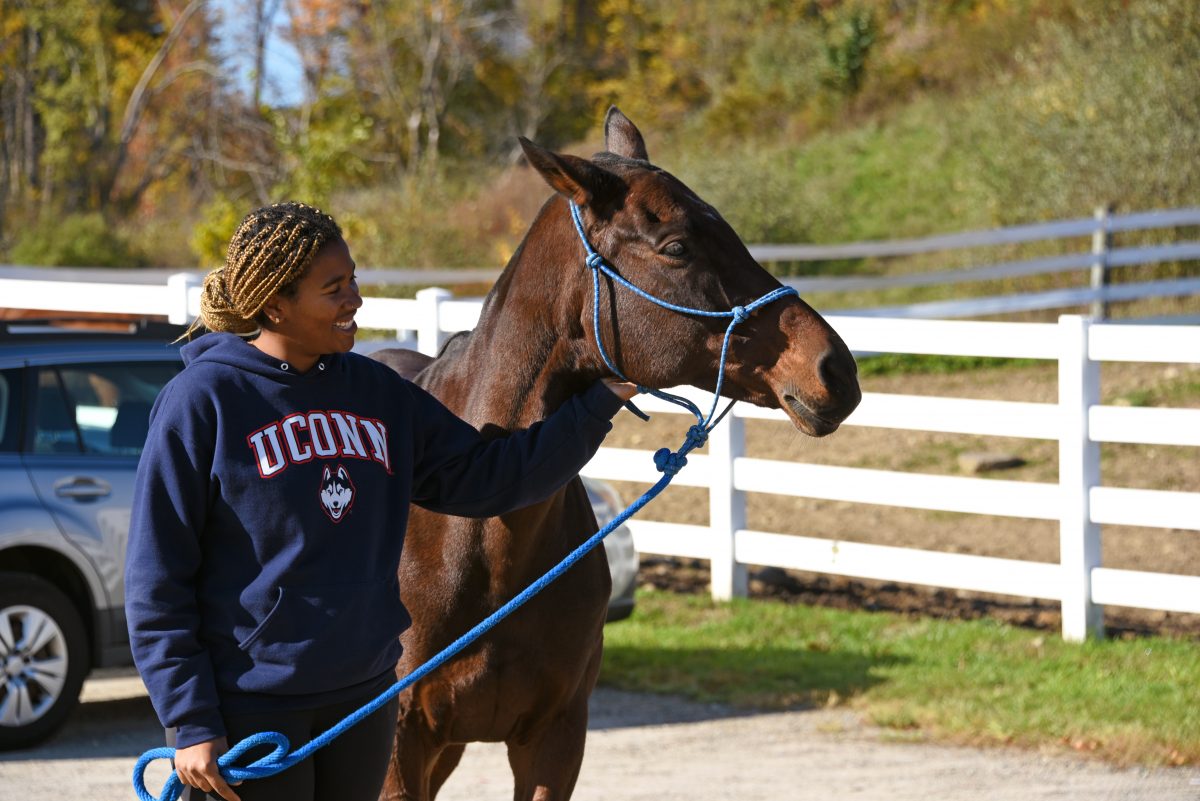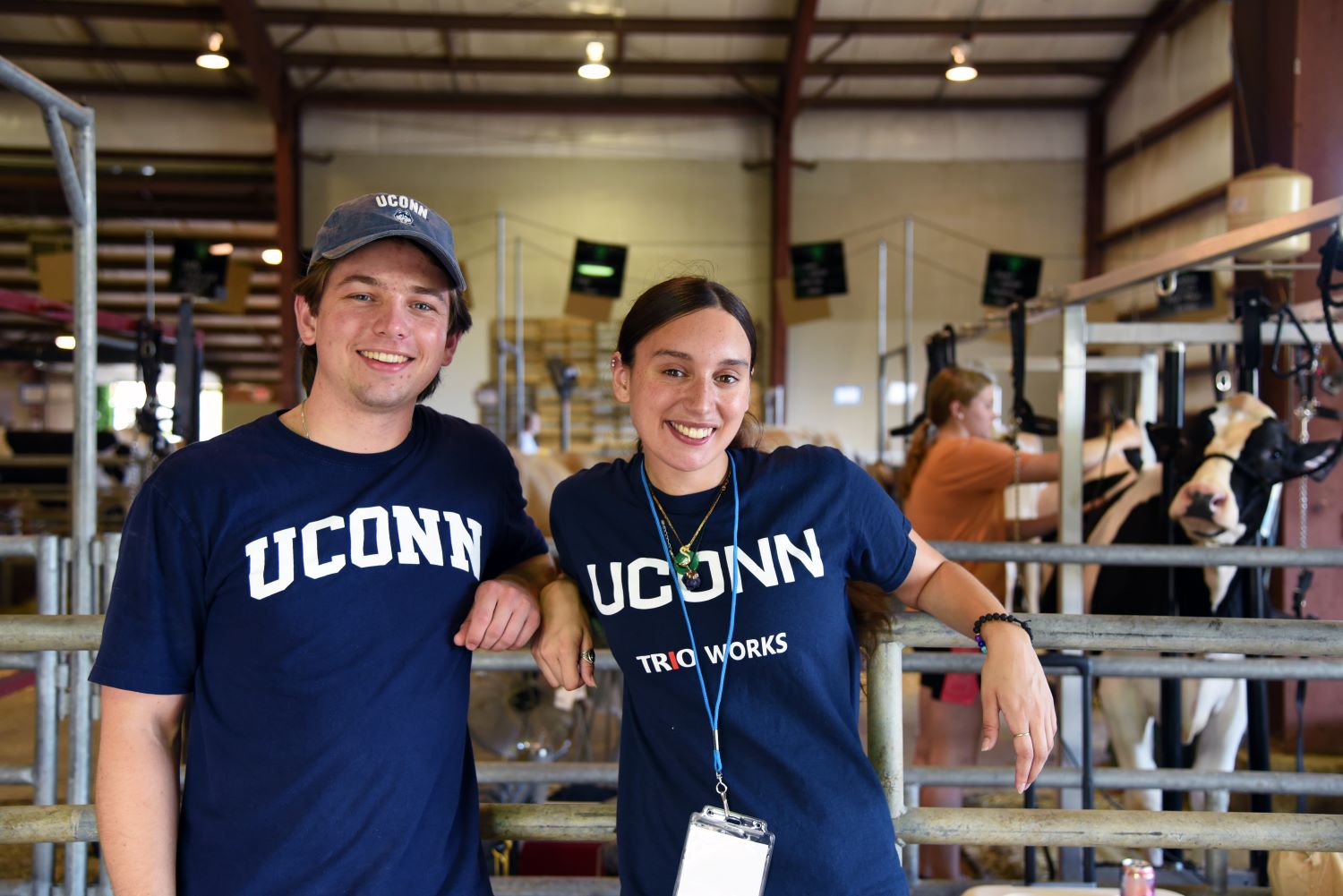Animal Science Programs
Animal Science majors in the Ratcliffe Hicks School of Agriculture receive an Associate of Applied Science (AAS) degree. Students may choose to focus on Equine Studies or Dairy/Livestock Management.
Equine Studies
The Equine program at UConn is one of the oldest and most recognized horse programs in the Northeast. It initially focused on draft horses and transitioned to light horses in 1931. The Animal Science Department currently maintains approximately 85 horses and specializes in the breeding of Morgans. We also have a very successful polo program. The Equine Science program in the Ratcliffe Hicks School is offered by the Department of Animal Science.
Recommended Course Sequence for Equine Focus
Concentration Objectives
The Equine option in Animal Science is designed to prepare students for a successful career in the horse industry. Graduates should be able to:
- Integrate the knowledge and skills required to efficiently manage an equine operation
- Understand the importance of genetics, physiology, nutrition, training and other factors that contribute to horse health and performance
- Incorporate appropriate management techniques, such as feeding, exercise, mare and foal care, and disease control into equine operations
- Select and evaluate horses, and demonstrate training and riding skills
- Communicate effectively, both orally and in writing, and work well with others
- Relate principles of science and technology to the equine industry
Students selecting the Equine option in Animal Science develop a broad base of knowledge and skills to prepare for a successful career. Courses provide a balance of theoretical and practical instruction in anatomy, physiology, nutrition, breeding and reproduction, behavior, and management. Ratcliffe Hicks courses that specifically address the equine species include:
- Horse Production
- Light Horse Training and Management
- Methods of Equitation Instruction
- Management of the Horse Breeding Farm
- Management Skills and Practices
- Horse Selection and Evaluation
The Equine program provides students with a challenging and well-rounded education and combines the latest scientific knowledge with practical skills and hands-on experience. Descriptions of all of the courses in the Ratcliffe Hicks School of Agriculture can be found in the Undergraduate Catalog.
Career Opportunities
Students have a wide array of options after graduation. Graduates may pursue immediate employment in positions such as those listed below, or continue their education to further expand career opportunities.
- Horse Trainer
- Feed Sales and Marketing Representative
- Laboratory Animal Technician
- Veterinary Assistant
- Equitation Instructor\Breed Association Representative
- Horse Farm Manager
If you are interested in additional information, including application timeline, please complete this form.
Dairy/Livestock Management
Animal Science majors in the Ratcliffe Hicks School of Agriculture (RHSA) receive both theoretical and hands-on education in the management of livestock, dairy cattle, poultry and horses. Students interested in dairy or livestock production concentrate on the influence of genetics, physiology, nutrition, and health on the economic production of animals. Species studied include dairy cattle, beef cattle, sheep, swine, poultry and horses. Students work directly with animals on campus, and may also choose to pursue off-campus work experience or internship opportunities in production or related enterprises. The Dairy/Livestock program in the Ratcliffe Hicks School of Agriculture is offered by the Department of Animal Science.
Recommended Course Sequence for Dairy/Livestock Management Focus
Concentration Objectives
The Dairy/Livestock option in Animal Science is designed to prepare students for a successful career in the dairy or livestock industry. Graduates should be able to:
- Integrate the knowledge and skills required to efficiently manage dairy, beef, sheep, poultry, and swine operations
- Demonstrate the ability to think clearly and critically about farm management issues and problems, and make appropriate decisions in a variety of situations
- Communicate effectively, both orally and in writing, and integrate appropriate management techniques, such as milking, feeding, young animal care, and disease control into production operations
- Recognize the importance of genetics, physiology, nutrition, health, and other factors that contribute to the efficiency and quality of animal production
- Use appropriate computer applications to increase the efficiency of production enterprises
Career Opportunities
Many career opportunities are available to graduates of the dairy/livestock program. These include:
- Farm Manager
- Veterinary Assistant
- Herd Manager
- Breed Association Representative
- Livestock Breeder
- Artificial Insemination Technician
- Technical Representative
- Laboratory Animal Technician
- Animal Welfare Technician
- Feed and Animal Product Sales Representative
- Animal Sales and Marketing Specialist
- Meat and Food Processing Technician
- Breed Association Representative
If you are interested in additional information, including application timeline, please complete this form.

